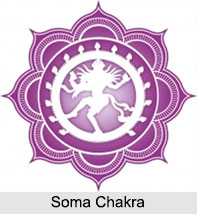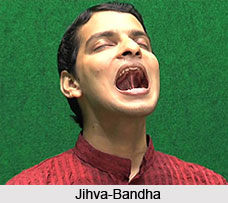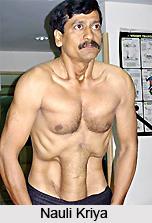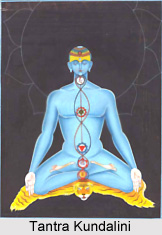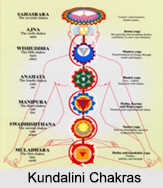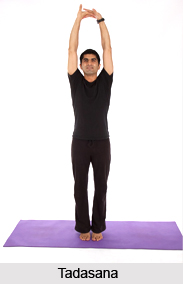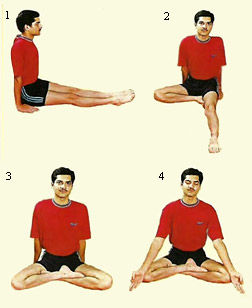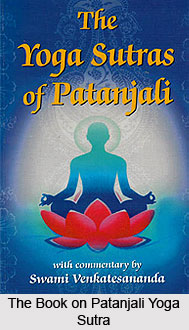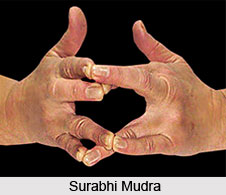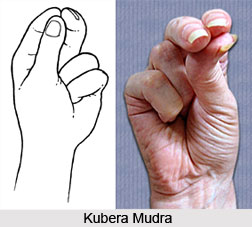The first yoga sutra explains about the numerous processes, through which a yogi can gain accomplishments. Accomplishments consist of five kinds, and distinctions are there among them. By performing penance and observing a restrained life, a yogi is sure to reach a state of `godhood`.
janma birth
ausadhi medicinal plant, herb, drug, incense, elixir
mantra incantation, charm, spell
tapah heat, burning, shining, an ascetic devotional practice,
burning desire to reach perfection, that which burns all impurities
Samadhi profound meditation, total absorption
Jah born
Siddhayah perfections, accomplishments, fulfilments, attainments
Accomplishments may be attained through birth, the use of herbs, incantations, self-discipline or samadhi.
There are five types of accomplished yogis (siddhayah):
1. by aspiration to become perfect (janma)
2. by spiritual experience gained through herbs, drugs or elixir (ausadha)
3. by incantation of the name of one`s desired deity (mantra)
4. by ascetic devotional practice (tapas)
5. by profound meditation (samadhi)
There is an important distinction between these means of spiritual accomplishment. Followers of the first three may fall from the grace of yoga through pride or negligence. The others, whose spiritual gains are through tapas and samadhi, do not. They become masters, standing alone as divine, liberated souls, shining instances to mankind.
Nandi, Ramakrishna Paramahansa, Sai Baba of Sirdi and Ramana Maharsi were accomplished yogis by birth.
Sage Mandavya and King Yayati developed supernatural powers through an elixir of life. Today many drug users employ mescalin, LSD, hashish, heroin, etc. to experience the so-called spiritual visions investigated by Aldous Huxley and others. Artists and poets in the past have also relied on drugs to give rise to supernormal states to enhance their art.
Mandavya was a sage and a yogi. In his childhood days his only game was to kill flies. When he grew up, he reached samadhi by tapas. Local thieves were surreptitiously using his asrama as a resting place after plundering and bringing back their prize. People went to the king and told him of their agony and fear for their lives. The king, at once, ordered his attendees to find the thieves and put them to the gallows. The party traced the thieves to the yogi`s asrama and brought all of them, including the sage, and hanged them. Everybody died except the sage. Seeing this wonder, the king came and apologised and released him from the gallows. But the sage kicked and broke the gallows and died of his own will.
Attendants of Yama (Lord of Death) carried the sage to hell. He was shocked to find himself there and asked the God of death the reason for bringing him to hell. The Lord replied that, having killed flies in his childhood, he had come to hell. The sage was enraged and thundered that the crimes of childhood days belong to the parents, and not to the children. The sage said to the Lord: `You do not know dharma (science of duty), hence I curse you to be born on earth as the son of a sudra for having failed in your duty as an impartial judge of man`s sins`, and then the sage returned to his old hermitage as young as ever. Due to this curse, the Lord of Death took birth as Vidura and acted as adviser to King Dhritarashtra from Mahabharata.
King Yayati was the son of Nahusa. He had two wives. One was Devayani (daughter of Sukracarya, preceptor of the demons and inventor of the elixir of life - sanjivani), and the other was Sarmistha. As the king`s worldly power increased manifolds, his lust for sensual joy increased, and he committed adultery. Devayani, infuriated by her husband`s infidelity, returned to her father and complained of her husband. Sukracarya cursed the king with premature old age. Then her affection for Yayati sprang out and she pleaded with her father that the curse was too strong. Listening to his daughter`s pleas, he consented to transfer the curse to any one of the king`s sons if they would accept it. None of his sons came forward except his youngest son, Puru. Puru accepted his father`s old age and the father kept his youth. Later in life, Yayati realised that lust (kama) can never be quelled at all. He returned his youth to his son along with his kingdom. He took back his old age and returned to the forest to devote the rest of his life to meditation.
Many sadhakas initiated through mantras performed penance and became spiritual masters, poets and scholars. The dacoit Ratnakar became the author of the famous epic Ramayana; Dhruva, the son of King Uttanapada, reached Godhood; while young Prahlada, son of the demon King Hiranyakasipu, made God come out of a pillar.


